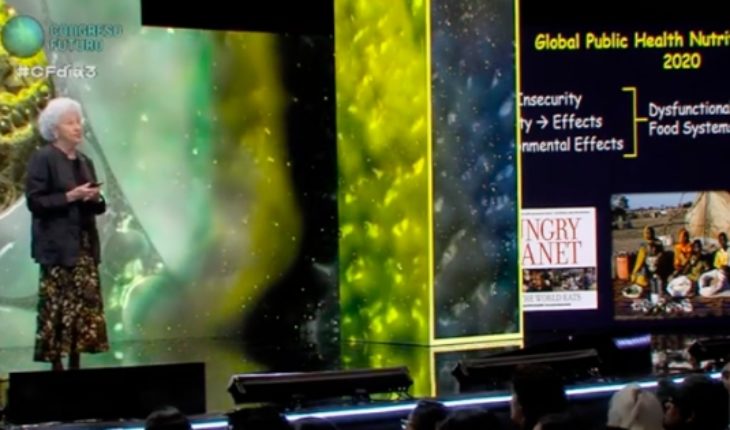The third day of the Future Congress 2020 arrived with the environmental problems that compuncel the 21st century, and the consequent social needs that derive from it. These and other topics, such as habitability and contribution of science, were collected in a day where seven panels were developed: Nurture, Questioning, Valoraring, Challenging, Habiting, Awareness and Contributing.
She was the PhD in molecular biology and professor of nutrition, food studies and public health at New York University, Marion Nestle, in the Nutrir panel. There Nestle focused his talk on food needs. Specifically, he turned his attention to the controversial ultra-processed foods.
“Studies show that people who eat foods that are ultra-processed foods in relation to processed eat more calories, eat many more calories, gain weight, and have a higher risk of type 2 diabetes and
even higher mortality,” the academic said.
But Nestle went further and noted his criticism of the group of companies behind food production: the so-called food industry. For the specialist, this industry is the “invisible elephant” of the food process. In fact, he believes that these companies, from a marketing point of view, act just like tobacco companies. And he has arguments for asserting it.
It turns out that the PhD in biology compiled on her blog, between March 2015 and March 2016, studies sponsored by the food industry. Of the 168 studies, 156 had favorable conclusions to this industry.
Alarming food figures in Chile
The second talk of the panel was led by the nutritionist and Intersectoral Coordinator of the System Chooses To Live, Sofia Bustos. Busts provided alarming data on food problems: Globally, 11 million deaths from malnutrition occur worldwide, 830 million people go hungry and 2 billion are overweight or obese.
In Latin America, meanwhile, for every person who goes hungry, six suffer from being overweight and obese. In Chile, the figures are not encouraging at all. It is the country with the highest number of obese adults in the OECD.
Nutritionist also revealed that people, the less years of schooling, were more exposed to obesity. The same is true of those who live in rural territories.
According to Bustos, in Chile, by 2010, only 5.3% of the population met the healthy eating rate. In the same vein, only 15% of Chileans consume the internationally recommended level of fruits and vegetables, according to the 2017 National Health Survey.
Environmental issues
“Sustainable development we didn’t reach, it caught us late.” With these words began his talk the Costa Rican scientist and founder of the University for International Cooperation, Eduard Muller.
The expert elaborated on the Planetary Limits methodology, developed 10 years ago in Stockholm. It highlights the nine “most important” planetary changes. This includes loss of biodiversity, fertilizer use, subsoil modification and climate change.
“Agriculture is responsible for 80% of global changes. 80% of planetary destruction is due to agriculture,” said Muller. He emphasizes, “at the moment 3/4 parts of the planet does not have the biological biodiversity necessary to support humans.”
Eduard also directed criticism of President Sebastián Piñera and Environment Minister Carolina Schmidt for the reforestation with eucalyptus and pine trees. “They’re green deserts, ” he speculated.
“The world is a hay cart”
The mechanical civil engineer and director of Endeavor Chile, Petar Ostojic, split his presentation with a Flemish proverb. “The world is a hay cart where everyone gets what they can most.” That hay, precisely, is not enough for the whole globe.
“Today, according to calculations, we need 1.7 planets lands to sustain the lifestyle we lead,” Ostojic said. And he turned his gaze to 30 more years: by 2050 it is estimated that 2.7 planets will be needed.
The “lifestyle we lead” to Petar is the linear model, an economic model that drags on since the first industrial revolution, based on the use of fossil fuels.
To mitigate the consequences of this model, it must change, according to the engineer, to a circular economy model.
“Circular economy and fourth industrial revolution are two sides of the same coin. It is the circular economy that stimulates the creation of these technologies and the technologies of Industry 4.0 are the ones that allow us to develop these models of circular economy”, says Ostojic.
“The most important thing in a circular economy is design. That’s where the right decisions are made. Choosing materials that are 100% recyclable and making our products easily repairable and remanufacturable,” says Petar.
The Valorar Panel was closed by the 2018 Nobel Prize in Chemistry, Frances Arnold. The Nobel emphasized “the evolution to the future” with examples of projects, with an environmental and sustainable view, in which he has participated. These include the production of fuel from biomass or the creation of an alternative to pesticides. The latter is related to the incidence in sexual intercourse of insects. It turns out that the male follows the female by an “perfume” that they expel, the pheromones. A farmer can spread that “perfume” and the male gets confused. Frances recounts that Mexican farmers are stopping using pesticides, and are beginning to prefer the use of pheromones.
translated from Spanish: Future Congress: how food affects health, the environment and the environment
January 16, 2020 |




